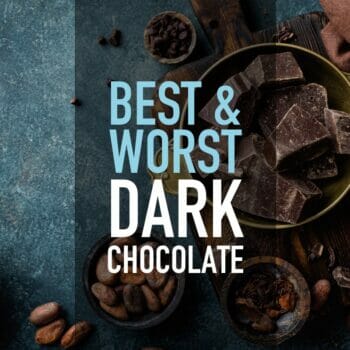Almond Milk: The Best and Worst Brands

Almond milk is one of an ever-growing line of plant-based alternatives to traditional cow’s milk.
The current list includes: oat milk, soy milk, almond milk, rice milk, flax milk, hemp milk, and coconut milk, hazelnut milk, cashew nut milk, and even potato milk.
Oh, and pecan milk, pea-protein milk – pretty much anything that you can combine with water 😀.
Almond milks can taste bland and watery. Others have considerable amounts of sugar (presumably to camouflage the bland flavor).
Frustratingly, manufacturers don’t list almond percentage. However, you can assume it’s about 2%.
Concerns around almond production are the high amounts of water required, and the packaging of some of these milks.
The Best
- Elmhurst – minimal ingredients, high almond.
- Malk – minimal ingredients, high almond.
- Three Trees – minimal ingredients, high almond.
- Silk – organic – best on a budget.
The Worst
Almond Dream – one of the few to still use carrageenan.
The full list of almond milks

Elmhurst
Range: Unsweetened.
Ingredients: Filtered Water, Almonds.
Almond Percentage: Unlisted (but high protein = more almonds).
- Non-GMO.
- Carrageenan free.
- 5 g of protein

Malk
Range: Vanilla, Unsweetened (both 0 g sugar).
Ingredients: Filtered Water, Organic Almonds, Himalayan Pink Salt.
Almond Percentage: Unlisted (but high protein = more almonds).
- Non-GMO.
- Carrageenan free.
- 4 g of protein

Three Trees
Range: Original unsweetened, vanilla bean and black sesame (sweetened with dates).
Ingredients: Filtered water, organic almonds.
Almond Percentage: Unlisted (but high protein = more almonds).
- Non-GMO, organic
- Carrageenan free.
- 4 g of protein

New Barn
Range: Unsweetened, unsweetened vanilla and barista.
Ingredients: Organic Almondmilk (Filtered Water, Organic Almonds), Sea Salt.
Almond Percentage: Unlisted.
- USDA Organic, non-GMO.
- Carrageenan free
- 3 g protein

Silk
Original (7g sugar per cup), Vanilla (13g sugar), Dark Chocolate (17g sugar), Less Sugar (3g sugar), Less Sugar Vanilla (6g sugar), Unsweetened, Unsweetened Vanilla, and a USDA Organic unsweetened (Costco). Also ‘extra creamy’ – has sunflower oil in it.
Ingredients (original): Almondmilk (Filtered Water, Almonds), Cane Sugar, Vitamin and Mineral Blend (Calcium Carbonate, Vitamin E Acetate, Vitamin A Palmitate, Vitamin D2), Sea Salt, Gellan Gum, Sunflower Lecithin, Locust Bean Gum, Ascorbic Acid (to protect freshness), Natural Flavor.
Almond Percentage: Unlisted.
- Uses non-GMO almonds.
- Carrageenan free.

Mooala
Range includes original (5g sugar per cup), vanilla bean (5g sugar) and unsweetened.
Ingredients (original): Filtered Water, Organic Roasted Almonds, Organic Honey, Less Than 2% Of: Calcium (Calcium Carbonate), Sea Salt, Gellan Gum.
Almond Percentage: Unlisted.
- USDA Organic
- Non-GMO.
- Carrageenan free.

Califia Farms
Their range includes Vanilla (3g sugar per cup), Unsweetened, Unsweetened vanilla, toasted coconut, and a number of blends.
Ingredients (unsweetened): Almondmilk (Water, Almonds), Calcium Carbonate, Sunflower Lecithin, Sea Salt, Natural Flavors, Locust Bean Gum, Gellan Gum, Potassium Citrate.
Almond Percentage: Unlisted.
- Non-GMO project verified.
- Carrageenan free.

Blue Diamond Almond Breeze
Range: Original (7g sugar per cup), Vanilla (12g sugar), Chocolate (17g sugar), Coconut (6g sugar). Each of these has an unsweetened version.
Ingredients (original): Almondmilk (Filtered Water, Almonds), Cane Sugar, Calcium Carbonate, Sea Salt, Potassium Citrate, Sunflower Lecithin, Gellan Gum, D-Alpha-Tocopherol (Natural Vitamin E).
Almond Percentage: Unlisted.
- Non-GMO.
- Carrageenan free.

Orgain
Range: Lightly sweetened vanilla (7g sugar / cup) Unsweetened vanilla.
Ingredients: Organic Almondmilk (Filtered Water, Organic Almonds), Organic Pea Protein, Organic Cane Sugar, Organic Natural Flavors, Contains 1% Or Less Of The Following: Tricalcium Phosphate, Organic Sunflower Lecithin, Tripotassium Citrate, Gellan Gum, Sea Salt, Natural Flavor, Organic Locust Bean Gum, Ergocalciferol (Vitamin D2).
Almond Percentage: Unlisted.
- Organic, non-GMO.
- Carrageenan free.
- 10 g protein (pea protein added).

Pacific Foods
Range: Original (7g sugar / cup), vanilla (10g sugar) + unsweetened versions.
Ingredients: Water, Cane Sugar*, Ground Almonds*, Contains 1% or Less Of: Gellan Gum, Natural Flavor*, Potassium Citrate, Sea Salt, Sodium Citrate, Vitamin D2, Xanthan Gum.
Almond Percentage: Unlisted.
- Organic, non-GMO.
- Carrageenan free.

Almond Dream
Range: Unsweetened.
Ingredients: Almond Base (Water, Almond Butter), Sunflower Lecithin, Tapioca Starch, Tricalcium Phosphate, Carrageenan, Sea Salt, Gellan Gum, Natural Flavors, Vitamin A Palmitate, Vitamin E (D-Alpha Tocopheryl Acetate), Vitamin D2, Vitamin B12 (Cyanocobalamin).
Almond Percentage: Unlisted.
Contains Carrageenan.
- Organic, non-GMO.

Whole Foods Market 365
Range: Original (7g sugar / cup), unsweetened and vanilla.
Ingredients: Organic Almondmilk (Filtered Water, Organic Almonds), Organic Cane Sugar, Sea Salt, Tricalcium Phosphate, Gellan Gum, Organic Locust Bean Gum, Vitamin A Palmitate, Ergocalciferol (Vitamin D2), Dl-alpha-tocopherol Acetate (Vitamin E), Cyanocobalamin (Vitamin B12).
Almond Percentage: Unlisted.
- Organic, non-GMO.
- Carrageenan-free
Why should you NOT drink almond milk?
There are very few reasons. The good almond milks are a great non-dairy beverage.
- Carrageenan
A texturizing additive derived from seaweed that was once in almost all almond milks. Regarded as safe by the FDA, but some people reported gastrointestinal issues. After a thorough review in 2022, the only one that still had carrageenan was Almond Dream brand. - Additives
Thickeners and gums can be found in non-dairy milks – to give them a better texture and mouthfeel. These are not harmful, but can “occasionally Chris Kesser be problematic for those with digestive issues simply because they’re mostly indigestible, but it’s very unlikely any of them will actually cause harm”. - Vitamin A Palmitate
Some almond milks are fortified with vitamins. Vitamin A palmitate may be sourced from palm plantations that are damaging to ecosystems.
What’s the difference between shelf-stable and refrigerated almond milk?
- Shelf-stable milks come in cartons (tetrapaks) and can be stored in the pantry until opened.
- Shelf-stable is heated with a process called ‘aseptic’ to sterilize.
- Refrigerated is processed with a high-temperature pasteurization.
- Refrigerated come in plastic bottles OR cartons, and must go straight into the fridge.
Opinion: Refrigerated almond milk tastes better.
What is almond milk packaging like?
Most shelf-stable milks are shipped in Tetrapak cartons. Despite the considerable info on sustainability on their site, Tetrapak recycling is not straightforward.
- Most local authorities do not accept these cartons for recycling (so they go to landfill).
- Where recycling is accepted – it is a complex affair. Tetrapak are clever packages allowing liquids to sit on shelves for a long time, are lightweight, and can be packed in bulk efficiently. However they are made up of paperboard, polyethylene (plastic), and 5% aluminium. Recycling is expensive and complex (and in reality can only be downcycled).
After years of buying tetrapak, shelf-stable milks – I now buy only refrigerated non-dairy milks in a plastic bottle than can easily be recycled.
Other Almond milk brands
- Simply Nature (Aldi) – Check ingredients label. Did contain A-palmitate.
- Friendly Farms (Aldi) – Check ingredients label. Also contained A-palmitate.
- Simple Truth (Krogers) – Has Vitamin A Palmitate.
- Great Value (Walmart) – Has Vitamin A Palmitate – looks to be the same almond milk as the Krogers brand.
- Kirkland Signature (Costco) – Has Vitamin A Palmitate.
- Publix – Has Vitamin A Palmitate.
- Beber (California) – Just two ingredients – filtered water and organic almonds. Only available in smaller outlets in California.
- So Delicious – This brand has taken almond milks on and off the market a number of times.
- Natura (Canada) – Large range, no carrageenan
- Almo Milk (Australia) – A boutique milk with just 5 ingredients: Filtered water, 5% almonds, calcium, non GM xanthan, sea salt.
- Vitasoy – This Hong Kong based company markets to NZ and Australia. Almond percentage: 3.3%
- So Good (NZ & Australia) – Sweetened and unsweetened varieties. Almond Percentage: 2.5%
- Australia’s Own Organic (Australia) – Certified organic lightly sweetened with Agave Syrup. Almond Percentage: 2.4%.
- Macro Organic Almond Milk (Australia / NZ) – A store brand (Woolworths/Countdown) with 4% almonds.
- Pure Harvest (Australia) – Certified organic, uses Rice Syrup to sweeten. Claim 7% almond content (activated almonds).
- Alpro Almond Milk (UK) – 2.3% almond content.
- Earth’s Own So Fresh (Canada) – Has Vitamin A Palmitate.
Almond Pasteurization
From 2007 onwards all almonds grown in the US must be pasteurized (after some outbreaks of Salmonella during the early 2000s). This process is either done by steam treating the almonds, or by using the fumigant Propylene Oxide (PPO) (see more). PPO is an animal carcinogen, but the USDA and EPA consider the dosage levels on almonds to be so low as to be completely safe.
To avoid almonds sterilized with PPO, choose an organic source which will have been treated with steam.
Making your own almond milk
I’ve had a good honest go at making my own almond milk (recipe).
You just need water, almonds, and a nut milk bag to strain.
Confession: Despite the well-meaning people that say “it’s just 10 minutes” – I gave up after about 3 weeks. The end product definitely is way creamier (more almonds), and you can make up your own flavorings (I put a bit of maple syrup in).
However, it lasts 3 days maximum in the fridge. Call me lazy (many people do), but reaching for it in the morning – seeing it was off – then having to make up a new batch… you get the picture 😋.
The best and worst coconut milk.
ReferencesReferences
- Pan, Z., Bingol, G., Brandl, M. T., & McHugh, T. H. (2012). Review of current technologies for reduction of Salmonella populations on almonds. Food and Bioprocess Technology, 5(6), 2046-2057.
- Chang, S. S., Han, A. R., Reyes‐De‐Corcuera, J. I., Powers, J. R., & Kang, D. H. (2010). Evaluation of steam pasteurization in controlling Salmonella serotype Enteritidis on raw almond surfaces. Letters in applied microbiology, 50(4), 393-398.

 Dark Chocolate: The Best and Worst Brands
Dark Chocolate: The Best and Worst Brands The Best Plant-Based Burgers: Brands to Choose and Avoid
The Best Plant-Based Burgers: Brands to Choose and Avoid 18 Macro Friendly Desserts and Sweet Treats
18 Macro Friendly Desserts and Sweet Treats 10+ Delicious and Clever Ways to Eat More Vegetables
10+ Delicious and Clever Ways to Eat More Vegetables What Are The Best Snack Bars? Brands to Choose and Avoid
What Are The Best Snack Bars? Brands to Choose and Avoid